#Gladys Barton
Explore tagged Tumblr posts
Text
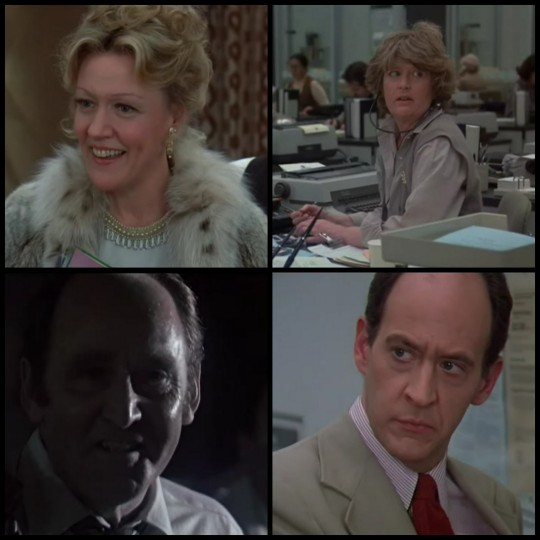
The 9 to 5/Golden Girls crossover!
#9 to 5#nine to five#Missy Hart#Marian Mercer#Cousin Magda#Peggy Pope#Margaret Foster#Gladys Barton#Character Actor#Richard Stahl#Meade#Golden Girls#The Golden Girls#Earl Boen#Perkins#Father Salerno
17 notes
·
View notes
Text

#polls#movies#the maltese falcon#40s movies#old hollywood#john huston#humphrey bogart#mary astor#gladys george#peter lorre#barton maclane#have you seen this movie poll
95 notes
·
View notes
Text
Like NBC was trying to cash in on the Batman craze with Captain Nice, CBS also tried to cash in with Mr Terrific. The series was about Stanely Beamish (Stephen Strimpell) a gas station attendant who could transform into a superhero when he took a pill developed by the government. In the unaired pilot, Beamish was played by Alan Young. The first episode aired on January 9, 1967. Legendary voice actor Paul Frees was the narrator. ("Matchless" Mr Terrific, TV Event)

#nerds yearbook#real life event#premiere#sci fi tv#super hero#january#1967#stephen strimpell#stanley beamish#dick gautier#hal walters#first appearance#paul smith#harley trent#john mcgiver#barton j reed#luciana paluzzi#mala valenska#harold j stone#shenko#iggie wolfington#petrov#richard erdman#manny#susan seaforth hayes#gloria#marriane gordon#gladys#paul frees#jerry ayres
4 notes
·
View notes
Text
Okay, folks, the mini-tourney is inching closer to the finals, so I'm going to give a list of the competitors in the Miss Billboard Tourney in order to give everyone a chance to submit more propaganda. The nominees are:
Lale Andersen
Marian Anderson
Signe Toly Anderson
Julie Andrews
LaVerne Andrews
Maxene Andrews
Patty Andrews
Ann-Margret
Joan Armatrading
Dorothy Ashby
Joan Baez
Pearl Bailey
Belle Baker
Josephine Baker
LaVern Baker
Florence Ballard
Brigitte Bardot
Eileen Barton
Fontella Bass
Shirley Bassey
Maggie Bell
Lola Beltran
Ivy Benson
Gladys Bentley
Jane Birkin
Cilla Black
Ronee Blakley
Teresa Brewer
Anne Briggs
Ruth Brown
Joyce Bryant
Vashti Bunyan
Kate Bush
Montserrat Caballe
Maria Callas
Blanche Calloway
Wendy Carlos
Cathy Carr
Raffaella Carra
Diahann Carroll
Karen Carpenter
June Carter Cash
Charo
Cher
Meg Christian
Gigliola Cinquetti
Petula Clark
Merry Clayton
Patsy Cline
Rosemary Clooney
Natalie Cole
Judy Collins
Alice Coltrane
Betty Comden
Barbara Cook
Rita Coolidge
Gal Costa
Ida Cox
Karen Dalton
Marie-Louise Damien
Betty Davis
Jinx Dawson
Doris Day
Blossom Dearie
Kiki Dee
Lucienne Delyle
Sandy Denny
Jackie DeShannon
Gwen Dickey
Marlene Dietrich
Marie-France Dufour
Julie Driscoll
Yvonne Elliman
Cass Elliot
Maureen Evans
Agnetha Faeltskog
Marianne Faithfull
Mimi Farina
Max Feldman
Gracie Fields
Ella Fitzgerald
Roberta Flack
Lita Ford
Connie Francis
Aretha Franklin
France Gall
Judy Garland
Crystal Gayle
Gloria Gaynor
Bobbie Gentry
Astrud Gilberto
Donna Jean Godchaux
Lesley Gore
Eydie Gorme
Margo Guryan
Sheila Guyse
Nina Hagen
Francoise Hardy
Emmylou Harris
Debbie Harry
Annie Haslam
Billie Holiday
Mary Hopkin
Lena Horne
Helen Humes
Betty Hutton
Janis Ian
Mahalia Jackson
Wanda Jackson
Etta James
Joan Jett
Bessie Jones
Etta Jones
Gloria Jones
Grace Jones
Shirley Jones
Tamiko Jones
Janis Joplin
Barbara Keith
Carole King
Eartha Kitt
Chaka Khan
Hildegard Knef
Gladys Knight
Sonja Kristina
Patti Labelle
Cleo Laine
Nicolette Larson
Daliah Lavi
Vicky Leandros
Peggy Lee
Rita Lee
Alis Lesley
Barbara Lewis
Abbey Lincoln
Melba Liston
Julie London
Darlene Love
Lulu
Anni-Frid Lyngstad
Barbara Lynn
Loretta Lynn
Vera Lynn
Siw Malmkvist
Lata Mangeshkar
Linda McCartney
Kate McGarrigle
Christie McVie
Bette Midler
Jean Millington
June Millington
Liza Minnelli
Carmen Miranda
Joni Mitchell
Liz Mitchell
Marion Montgomery
Lee Morse
Nana Mouskouri
Anne Murray
Wenche Myhre
Holly Near
Olivia Newton-John
Stevie Nicks
Nico
Laura Nyro
Virginia O’Brien
Odetta
Yoko Ono
Shirley Owens
Patti Page
Dolly Parton
Freda Payne
Michelle Phillips
Edith Piaf
Ruth Pointer
Leontyne Price
Suzi Quatro
Gertrude Rainey
Bonnie Raitt
Carline Ray
Helen Reddy
Della Reese
Martha Reeves
June Richmond
Jeannie C. Riley
Minnie Riperton
Jean Ritchie
Chita Rivera
Clara Rockmore
Linda Ronstadt
Marianne Rosenberg
Diana Ross
Anna Russell
Melanie Safka
Buffy Sainte-Marie
Samantha Sang
Pattie Santos
Hazel Scott
Doreen Shaffer
Jackie Shane
Marlena Shaw
Sandie Shaw
Dinah Shore
Judee Sill
Carly Simon
Nina Simone
Nancy Sinatra
Siouxsie Sioux
Grace Slick
Bessie Smith
Mamie Smith
Patti Smith
Ethel Smyth
Mercedes Sosa
Ronnie Spector
Dusty Springfield
Mavis Staples
Candi Staton
Barbra Streisand
Poly Styrene
Maxine Sullivan
Donna Summer
Pat Suzuki
Norma Tanega
Tammi Terrell
Sister Rosetta Tharpe
Big Mama Thornton
Mary Travers
Moe Tucker
Tina Turner
Twiggy
Bonnie Tyler
Sylvia Tyson
Sarah Vaughan
Sylvie Vartan
Mariska Veres
Akiko Wada
Claire Waldoff
Jennifer Warnes
Dee Dee Warwick
Dionne Warwick
Dinah Washington
Ethel Waters
Elisabeth Welch
Kitty Wells
Mary Wells
Juliane Werding
Tina Weymouth
Cris Williamson
Ann Wilson
Mary Wilson
Nancy Wilson
Anna Mae Winburn
Syreeta Wright
Tammy Wynette
Nan Wynn
Those in italics have five or more pieces of usable visual, written, or audio propaganda already. If you have any visuals like photos or videos, or if you have something to say in words, submit it to this blog before round one begins on June 25th!
If you don't see a name you submitted here, it's because most or all of their career was as a child/they were too young for the cutoff, their career was almost entirely after 1979, or music was something they only dabbled in and are hardly known for. There are quite a few ladies on the list whose primary career wasn't "recording artist" or "live musician," but released several albums or were in musical theater, so they've been accepted.
#long post#miss billboard tourney#i wasn't originally going to list them all but i decided to do so because there are so many without propaganda
48 notes
·
View notes
Photo
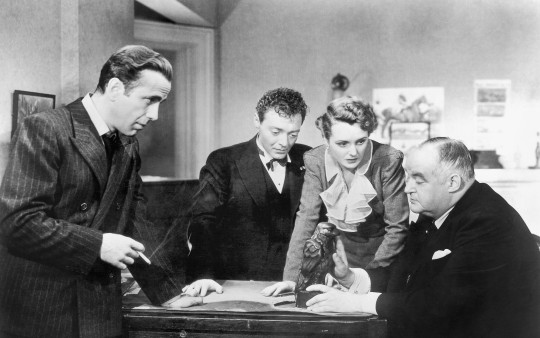
Humphrey Bogart, Peter Lorre, Mary Astor, and Sydney Greenstreet in The Maltese Falcon (John Huston, 1941)
Cast: Humphrey Bogart, Mary Astor, Gladys George, Peter Lorre, Barton MacLane, Lee Patrick, Sydney Greenstreet, Ward Bond, Jerome Cowan, Elisha Cook Jr. Screenplay: John Huston, based on a novel by Dashiell Hammett. Cinematography: Arthur Edeson. Art direction: Robert M. Haas. Film editing: Thomas Richards. Music: Adolph Deutsch.
"By gad, sir, you are a character," says Kasper Gutman (Sydney Greenstreet), with what Greenstreet's co-star Mary Astor once described as "that evil, hiccupy laugh." He is speaking to Sam Spade (Humphrey Bogart), who is certainly a character, if decidedly not a man of character. There aren't many other films so full of characters, but so lacking any with what one might call a moral center. Spade, for one, proves that you can be both misogynistic and homophobic -- as if proof of that were needed. Does he do the right thing at the end when he sends Brigid O'Shaughnessy (Astor) up the river? Perhaps, but he does it with such relish that it's hard to ascribe any probity to the act. The Maltese Falcon is one of the greatest examples of hoodwinking the censors of the Production Code, which among other things forbade depictions of homosexuality on screen. But does anyone miss the fact that Joel Cairo (Peter Lorre) is meant to be gay, from his fussy little perm to his teasing fondling of the handle of his umbrella to the scent of gardenia that Spade finds so amusing? And probably only the ignorance of Yiddish on the part of the Catholics in the Breen office allowed Wilmer (Elisha Cook Jr.) to be called a "gunsel" -- a word that originally meant a young man kept by an older man for sex. Actually, it was Dashiell Hammett who slipped that one by the watchdogs in the original novel; John Huston kept it when he wrote the screenplay, doubtless smiling the sly smile of someone who knows what he's getting away with. Even today, most people probably think like the Breen office and Hammett's editors, that it means a gunman. But Huston also got away with the clear indication that Spade had been having an affair with Iva Archer (Gladys George), the wife of his partner, Miles (Jerome Cowan). And is there anyone who doesn't realize that Spade has slept with Brigid? This was Huston's first feature as a director, and the result of all this Code-dodging, as well as his unwillingness to sentimentalize his characters, made him a formidable directorial force in the years to come, one of the few Hollywood directors who knew how to make movies for adults.
8 notes
·
View notes
Photo
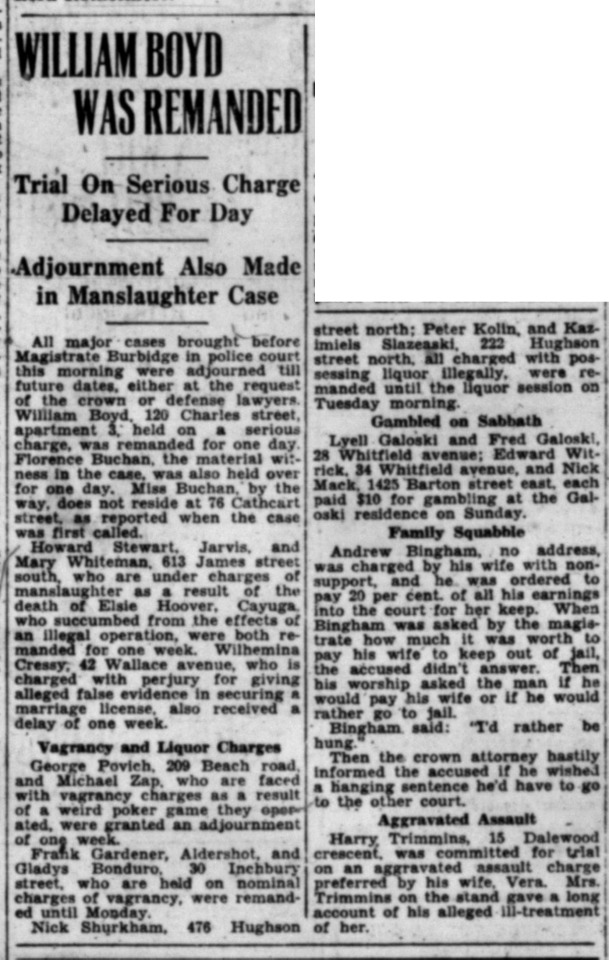
“WILLIAM BOYD WAS REMANDED,” Hamilton Spectator. March 20, 1931. Page 7. ---- Trial On Serious Charge Delayed For Day ---- Adjournment Also Made in Manslaughter Case --- All major cases brought before Magistrate Burbidge in police court this morning were adjourned till future dates, either at the request of the crown or defense lawyers William Boyd, 120 Charles street, apartment held on a serious charge, was remanded for one day. Florence Buchan, the material witness in the case, was also held over for one day. Miss Buchan, by the way, does not reside at 76 Catheart street, as reported when the case was first called.
Howard Stewart, Jarvis, and Mary Whiteman, 613 James street south, who are under charges of manslaughter as a result of the death of Elsie Hoover, Cayuga who succumbed from the effects of an illegal operation, were both remanded for one week. Wilhemina Cressy, 42 Wallace avenue, who is charged with perjury for giving alleged false evidence in securing a marriage license, also received a delay of one week.
Vagrancy and Liquor Charges George Povich, 209 Beach road, and Michael Zap, who are faced with vagrancy charges as a result of a weird poker game they operated, were granted an adjournment of one week.
Frank Gardener, Aldershot, and Gladys Bonduro, 30 Inchbury street, who are held on nominal charges of vagrancy, were remanded until Monday.
Nick Shurkham. 476 Hughson street north: Peter Kolin, and Kasimiels Slazenski, 232 Hughson street north. All charged with possessing liquor illegally, were remanded until the liquor session on Tuesday morning.
Gambled on Sabbath Lyell Galoski and Fred Galoski, 28 Whitfield avenue; Edward Witrick, 34 Whitfield avenue, and Nick Mack, 1425 Barton street east, each paid $10 for gambling at the Galoski residence on Sunday.
Family Squabble Andrew Bingham, no address, was charged by his wife with non-support, and he was ordered to pay 20 per cent. of all his earnings into the court for her keep. When Bingham was asked by the magistrate how much it was worth to pay his wife to keep out of jail, the accused didn't answer. Then his worship asked the man if he would pay his wife or if he would rather go to jail.
Bingham said: "I'd rather be hung.” Then the crown attorney hastily Informed the accused if he wished a hanging sentence he'd have to go to the other court.
Aggravated Assault Harry Trimmins, 15 Dalewood crescent, was committed for trial on an aggravated assault charge preferred by his wife, Vera. Mrs. Trimmins on the stand gave a long account of his alleged ill-treatment of her.
#hamilton#police court#remand prisoners#serious charge#illegal operation#manslaughter#operation#history of birth control#criminalizing vagrancy#liquor charge#illegal gambling#regulation of morality#marriage ceremony#non-support#no fixed address#alimony#great depression in canada#crime and punishment in canada#history of crime and punishment in canada#intimate partner violence
1 note
·
View note
Text
THE SCREEN: “Mae West Reveals Herself as a Circus Queen in “I’m No Angel” at the Paramount—Saturday's Millions”
I'M NO ANGEL, based on a story by Mae West and supported by Lowell Brentano; music and lyrics by Harvey Brooks, Gladys Du Bois and Ben Ellison; directed by Wesley Ruggles; a Paramount production. At the Times Square and Brooklyn Paramounts.
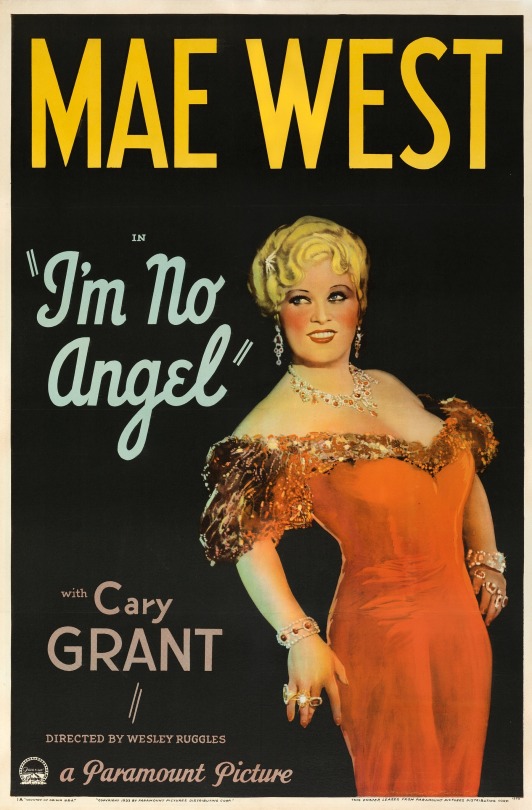
Tira .... Mae West Jack Clayton .... Cary Grant Bill Barton .... Edward Arnold Slick .... Ralf Harolde Alicia Hatton .... Gertrude Michael Kirk .... Kent Taylor Thelma .... Dorothy Peterson Benny Pinkowitz .... Russell Hopton Beulah .... Gertrud Michael The Chump .... William Davidson Rajah .... Nigel de Bruller Bob .... Irving Pichel Omnes.... George Bruggeman Harry .... Nat Pendleton Chauffeur .... Morrie Cohen Judge .... Walter Walker
by MORDAUNT HALL.
Arrayed in a variety of costumes which set off her sinuous form, Mae West is appearing at the Paramount in her latest screen vehicle, "I'm No Angel," a title which, as might be surmised, fits the leading character. Here Miss West, who wrote the story herself from “suggestions contributed" by Lowell Brentano, is beheld as a circus beauty named Tira, who wins applause and admiration by risking her blond head in a lion's mouth twice daily.
It is a rapid-fire entertainment, with shameless but thoroughly contagious humor, and one in which Tira is always the mistress of the situation, whether it be in the cage with wild beasts, in her boudoir with admirers or in a court of law.
Tira is ever ready with & flip double entendre and' she permits no skeleton to be found behind her cupboard doors. She has an emphatic personality, which proves a magnet for even social lights with millions. She receives costly presents, Including diamond necklaces, but she is hardly a gold-digger. She refrains from posing, preferring to keep to her natural slangy speech in her journey through the story from a tent to a penthouse.
She admits that she has thrown discretion to the winds, and she sometimes finds herself in an awkward predicament, but through a wily lawyer she succeeds in proving that she is guiltless. The feeble parts of this picture are those in which a criminal known as Slick is introduced. The less one sees of him the better one feels, for the production is interesting only as long as it proceeds on its merry route.
The glimpses of Tira making her impressive entry to the circus arena and then proceeding to the big cage with the roaring lions are depicted shrewdly. Tira does not actually stick her whole head in the lion's mouth, but contents herself by putting her face between the beast's jaws, which is quite enough.
Even this is set forth with a certain degree of fun, and one feels that Tira probably has a pistol ready for an emergency and that other circus employees are ready to shoot in the event that the beast starts to close its mouth. But one is apt to wonder whether they could possibly be quick enough. Society among the spectators is thrilled, all except one snobbish girl, who is furious because her fiancé is very enthusiastic over the performer's courage-and her beauty.
Later there comes the time when Tira puts her fair head into a court of law as the plaintiff in a breach-of-promise case. She sues Jack Clayton, whom she really loves, for $1,000,000, and it is not Tira's artful counsel who wins the case, but the circus queen herself. She cross-examines the defendant's witnesses and turns their testimony in her own favor, the unusual proceeding being countenanced by a judge whose sympathy Tira wins with the utmost ease.
Miss West plays her part with the same brightness and naturalness that attended her second film role. There is no lack of spontaneity in her actions or in the utterance of her lines. She is a remarkable wit, after her fashion. Cary Grant is pleasing as Clayton and Walter Walker is excellent as the considerate old judge. Gregory Ratoff does well as Tara’s lawyer. Wesley Ruggles has directed the film with his usual intelligence.
#Paramount Pictures#I’m no Angel#Mae West#Cary Grant#Edward Arnold#Ralf Harolde#Gertrude Michael#Kent Taylor#Dorothy Peterson#Russell Hopton#Gertrud Michael#William Davidson#Nigel de Bruller#Irving Pichel#George Bruggeman#Nat Pendleton#Morrie Cohen#Walter Walker#Mordaunt Hall#The New York Times
1 note
·
View note
Text
Father's Day
When: June 18, 2023 Where: Theo's house, Barton Point, ME Featuring: Jericho Gonzalez, Ricardo Nunez Triggers: Implications of alcoholism
Theo's parents were taking a month-long trip to the Dominican Republic, so their annual Father's Day barbecue was postponed until July. However, that meant Theo and Jericho had more time to spend watching baseball from the comfort of their living room. When the game ended, they both leapt up from the couch, but for different reasons.
"Oh come on!" Theo shouted in frustration.
"Haha! Pay up, old man!" Jericho exclaimed, cheerfully.
The Yankees were playing the Red Socks, and the father-son duo were each betting on different teams. Theo huffed, reaching into his pocket to pull out a crisp $20 bill. Unfortunately for Theo, the Red Socks had beaten the Yankees. Right as he was about to hand over the money, someone rang the doorbell. Of course, Oscar and Nacho started losing their shit, barking uncontrollably. "Hush you two! Echo, mind getting the door?" Theo asked, trying to wrangle the tow chihuahuas into his bedroom so they didn't pounce at the mystery person at the door.
The young Gonzalez snatched the money from his father's hand and bolted off to the door. Meanwhile, the older man scooped up the two yapping dogs, dropping them off onto his bed.
"Dad?!" Jericho shouted. "Can you come in here?!"
Theo whispered, "you be good" to the dogs before shutting the door behind them and reentering the living room. What he saw next nearly made him pass out. Standing in his doorway was none other than his ex--the biological father of his child, on Father's Day no less. "What the fuck are you doing here, Rico?"
"Shiiiiit," Ricardo stated, clapping his hands together. "Gladys wasn't kidding. You really do look like a dude now!"
Before Theo could retort, Echo beat him to it. "He is a dude. Dad, is what he's telling me true?"
Theo stood there, too stunned to speak. Was this really happening? Why was this happening? There were so many things he wanted to say, but nothing was coming out of his mouth. As he sat back on the couch, head held in his hand, the only thing that would come out oh his mouth was "What the fuck?!"
Rico took a step into Theo's living space. "Look, I know you're pissed. You have every right to be... Uh, sorry. I forgot what your new name is..."
"It's Theo... How did you get my address?"
"I ran into your sister at Wilton's. Look--"
Ricardo was about to say more, but was interrupted by Jericho. "Dad! Is this guy my other dad?!" Jericho yelled, dying with anticipation.
"Si, Mijo..." Theo answered, sighing. "This is Ricardo Nunez, your biological father..." He stood up in a frenzy, exclaiming, "Who said he didn't want any involvement! Why the fuck are you here?"
"Holy shit," Jericho muttered.
"Look, I know what I said when I found out you were having my kid. I was young and stupid. I had a lot going on and I didn't know how to handle being a parent. But I... I want to make up for lost time. I want to get to know my first-born. I want him to know his sisters."
"I have sisters?" Jericho interrupted.
"Two of them. Rosie is two and Sofia was born three months ago. If it's alright with you, Ca-- I mean, Theo... I'd like to bring Jericho over to my mom's house to meet them."
Theo was about to go off on him and tell him to go to Hell, but then Jericho asked, "Please? Please can I go?"
After a moment of silence, silence sharp enough to cut glass, he replied, "You know the rule. Be home before midnight."
Before he knew it, Jericho and Ricardo were gone. Everything that happened after the front door closed was a blur. Theo didn't know what to do or who to call. He felt four whole years of therapy and AA fly out the window. He fell back into old habits and found himself at the one place he swore to never set foot in again, a bar.
0 notes
Text
31 (Films) to Life: The Maltese Falcon (1941)
The name’s 365. And the game: mediocre film reviews.

There I was, on a normal winter afternoon. Snow falling from the clouds, glittering white spectacle hiding the harsh cold outside. Seems like the world is that way sometimes: beautiful at a glance, but it’ll kill you if you leave yourself bare and unprotected. That’s why I stay indoors in times like this; watch it from afar, and you can’t get hurt. So I’ve learned in my 30 years of being on this planet.
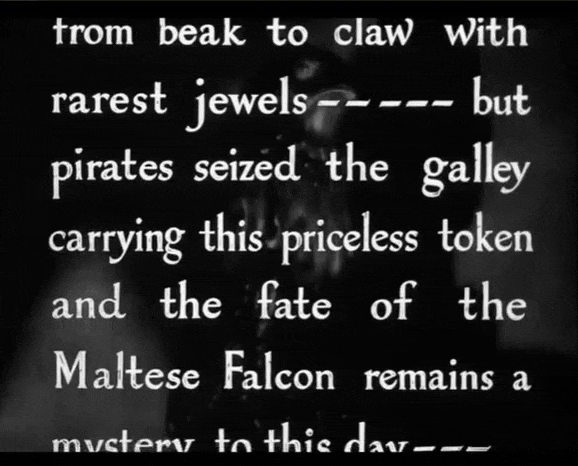
I settled down, decided on watching a moving picture that day. I had settled on watching a 1941 classic, The Maltese Falcon. They say it’s the first film noir, or at least the first film that defined the genre as we know it. I fired up the television, and found the movie in HBO Max. I grabbed a drink, a cool glass of raspberry lemonade Crystal Lite, and relaxed for the first time in what felt like a long time.
But before I tell you about this, I need to ask: are you in? This is a story full of twists and turns, and some of you may not want to come along for the ride. I don’t get out much, but from what I hear, the kids today call them SPOILERS. You sure you want to hear this story? Well, then, sit down; grab a lemonade. Because boy, do I have a story to tell you.
Spoilers ahead, buster.

The picture came on, and there he was: Humphrey Bogart. This hadn’t been the first time we’d crossed paths, although that was a different time...different people. He was in The African Queen, playing a boat captain in World War I era central Africa. I was watching romance movies at the time, and had no idea what I was doing. Well, Bogart was different. I still have no idea what I’m doing on this hellsite.

Bogart was in rare form. He was playing detective Sam Spade, one of the most famous characters in script and screen. A hard-nosed private eye who takes no guff from those who’d offer it. He was mean, he was lean...he was cool. I liked him, to be frank. Admired his moxie, you could say. Spade was sitting in his office, accompanied by his secretary Effie (Lee Patrick). She was also a tough gal, and I also liked her a lot. Movie came out it 1941, but it felt like she was Spade’s real partner throughout the film. As for his other partner...ah, but I’m getting ahead of myself. My mind wanders in times like these.

That’s when she walked in. Well, maybe I should say they. Entering into my little world was my fiancée, a bright spot in my temporarily shades-of-gray world. She looked at me and asked what I was doing, and why I was wearing a fedora and in black-and-white. I just said “noir”, and she figured it out; she’s a smart dame. She sat down and played Minecraft, or something. I was too wrapped up in the movie.
Entering Sam Spade’s office was Ruth Wonderly (Mary Astor), and I knew who she was right away: the stereotypical film noir love interest/seductress/not to be trusted person. She wove some story about her missing sister, not that I or Spade believed it. Caught the interest of his partner, Miles Archer (Jerome Cowan), and they agreed to help her out. Got Archer killed. Why? Because it was inevitable in a film like this. Partners die. It’s the rules of the game for a film noir private eye detective. As is this shot of a newspaper. Surprised it wasn’t spinning. Then again, my head was compensating for the both of us. Too much lemonade, I think. I should probably lay off, but I need something sweet to tolerate this salty and sour world.
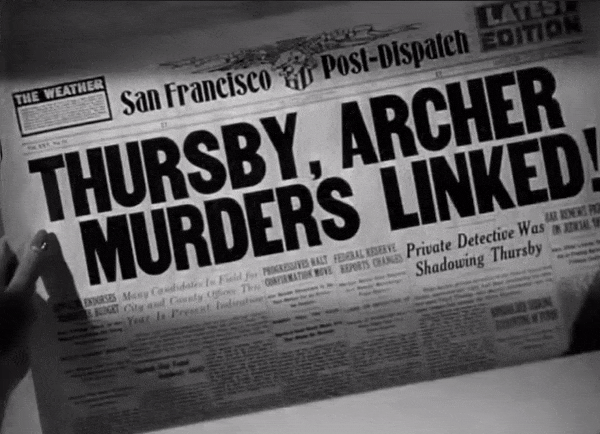
From there, the film went on in earnest. Archer’s wife, Iva Archer (Gladys George) is another in a likely long line of women in love with Sam Spade, and believes that Spade killed Miles to get her. Which, to me, sounds like somebody needs to get off her high horse; she’s liable to get hurt. Spade turns her away, but has two more visits soon enough. Detectives Dundy (Barton MacLane) and Polhaus (Ward Bond) are on his ass, also thinking he killed his partner. Idiots. He’s the main character in a film noir film. His hands might be dirty, but not with his partner’s blood.
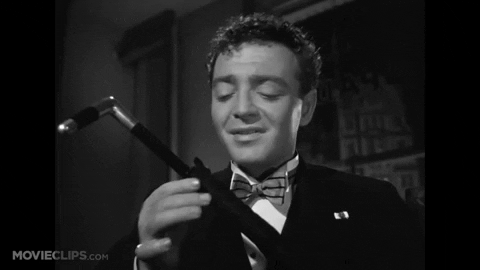
The last visit, though, comes from a curious character, and another familiar face to me. The large-eyed Hungarian man was none other than Peter Lorre, from the last movie, M. He was playing Joel Cairo, a crook and a smuggler looking for a priceless treasure: the Maltese falcon. He offers Spade a tidy sum for the statuette back in his possession, but I was distracted. I knew at once that I’d heard of this fabled object. Not only was it the title of the film, but it’s also one of film history’s best and greatest MacGuffins. While Joel pulled a gun and Spade knocked him unconscious IMMEDIATELY, I got to work.
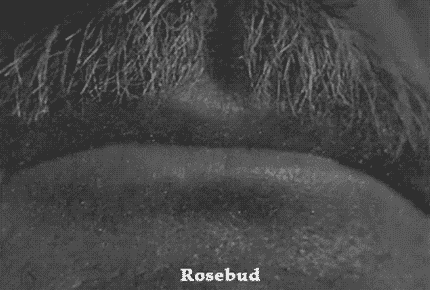
You’ve been in this business as long as I have, and you’ll be able to recognize a MacGuffin when you see it. Citizen Kane had the sled, Pulp Fiction has the briefcase of mystery, Frodo had to yank around that damn ring for three movies, et cetera. It’s that item that the plot centers around, that item that the characters have, need, or have a need to get rid of. But that’s not the only reason this little bird was flying through my head.
The Maltese falcon in particular is very well-known in film history. Why? A story for later on, but take it from be; it’s famous. So famous that I already knew the ending of this movie. A pity, but I had to stick through to the end. Which wasn’t hard, since the direction and cinematography by Western director John Huston and partner Arthur Edeson made me tear up a little bit. First time I’ve cried in hours. This film was gorgeous, no doubt about that; you could see that as plain as the nose o Bogart’s face. Easy on the eyes makes for easy watching, lemme tell ya.
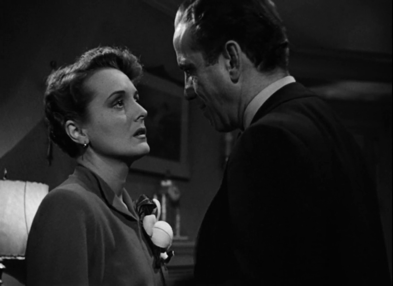
Spade thought the same thing about his client, the former Ruth Wonderly. I say former because, as I’d suspected, she was a sham and a pathological liar. Her real name was Brigid O’Shaughnessy, and she was in league with a group of smugglers and treasure hunters, one of whom was dead the same night as Archer. Another mystery to solve, although it’s pretty certain that the same dead man killed Archer before kicking his own bucket.
Soon, Spade decides to bring together the gang: him, Brigid, and Cairo. Together, at his apartment, they’ll figure out where they stand. When Cairo arrives, things are tense, real tense. He introduces another player into the mix: the Fat Man. That puts Brigid on edge, and makes Spade and I as curious as a cat in a canning factory. A new player? What role is he going to play in this sordid affair?
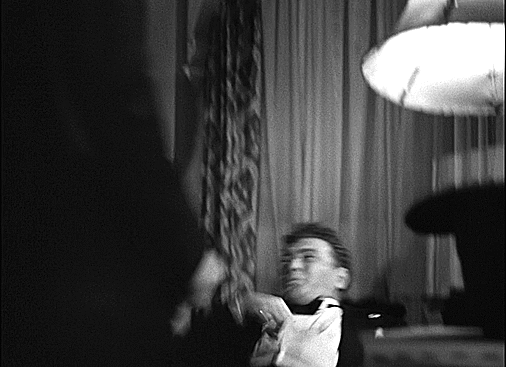
But just then, the tension boils over! Cairo pulls a gun, Spade bloodies his nose a bit, and then there’s a knock on the door. It’s Dundy and Polhaus, the nosy ninnies. They’ve come to talk with Spade, but end up breaking up the fight between Cairo and Brigid (feisty fella and dame that they are). Cairo’s taken into custody for questioning, and Brigid and Spade get to know each other. But all the while, somebody else is watching outside.

Doesn’t take long for us to meet that other person: a two-bit no-account thug named Wilmer (Elisha Cook Jr.). Handy with a knife as my lungs are with air, Wilmer’s not all there in the brainpan; a couple screws short of a full box, if you know what I mean. He threatens Spade, who takes it in stride. That’s our Sam for you; unnerved to the core. Anyway, Wilmer has a message for Spade, who’s at a hotel, waiting for Cairo post police questioning. Wilmer tells Spade that the Fat Man wants to meet him to propose a deal about the Falcon. Spade accepts, and goes to meet the man himself. And lemme tell ya...you’re gonna love this.
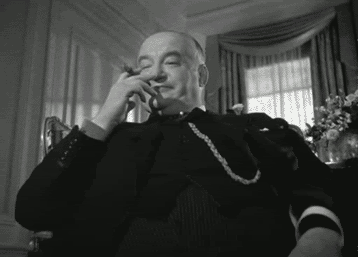
The minute I laid eyes on “Fat Man” Gutman (Sydney Greenstreet), I knew two things. One, this guy was one tough customer. And two, he is literally live action Kingpin (Wilson Fisk) before the character even existed. I did my research, and sure enough, Stan Lee based his famous NYC crime boss on Greenstreet, and on the Fat Man himself. I allowed myself to shed a tear in joy. Let’s go, Mets.
The Fat Man starts to dance around the topic of the Falcon, much to Spade’s feigned irritation. He throws a fit to get his way, and he gets his way alright. The Fat Man asks him to come back later that night, and he tells him the history of the little black bird. Apparently, it’s a treasure over 400 years old, and it’s worth a fortune. The Fat Man even offers Spade a quarter of the profits, were he to help them find it. But if you walk into a viper’s nest...expect to get bitten. Spade’s drink is spiked, and he passes out. Gutman, Wilmer, and the in-league Cairo escape, planning on going after the person they believe has the statue: Brigid.
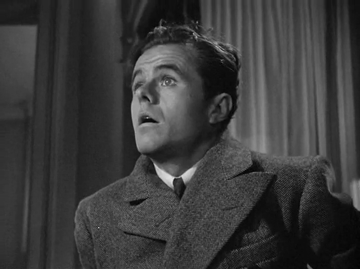
From there, all hell breaks loose. See, Brigid actually smuggled the statue to a friend, a boat captain at the harbor. The two got caught by the Fat Man and his guys, leading to a burnt-down boat, a dead captain, and the statue in Sam’s oh-so-capable hands. Brigid sent him, dying, to Spade’s office, with the statue in hands. And once the Falcon is recovered, Sam rescues Brigid from the Fat Man’s clutches, only to find the Fat Man and crew waiting for them at his place.
Three dead men and one burned boat, all for this little black statuette. Spade agrees to take $10,000, right off the bat, assuming somebody can get fingered for the three murders, including that of his partner. Looks like Wilmer’s the fall guy, the poor slob. After all, he did kill the boat captain and the other dead man...but not Archer. That’s still a mystery. But enough of that; it’s Christmas time, because it’s time to unwrap our presents.
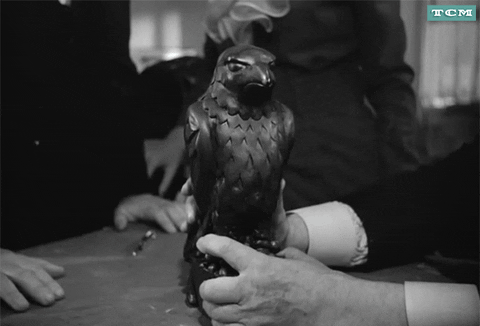
Ho. Ho. Ho. Somebody fetch the milk and cookies.
There it is: the Maltese Falcon. In the world outside of the silver screen, this little bird fetched $4.5 million at auction, making it one of the most valuable film props in film history. And in universe, underneath its black lacquer, priceless jewels rest beneath. Or, uh...so you’d think.
See, the big ending of the film, and the most ironic twist in film history, is that the statuette that was worth 4.5 big ones in real life...is a fake in the film. Three men dead, all for a useless, worthless, statue of a falcon. The owner of the bird swapped it out when he realized these idiotic treasure hunters were coming, making the entire struggle of the movie completely pointless. The world feels that way sometimes, to a film noir private eye. All that struggle, for a useless hunk of rock.
Cairo freaks out, and Gutman demands his money back. Spade takes a service fee, professional shyster that he is. Gotta admire that fella’s moxie. Cairo and Gutman make a clean escape to find the statue elsewhere, while Wilmer escapes and Brigid stays with Sam. But Spade knows the score now, and he lays the truth squarely on the liar’s head: Brigid killed Archer. And she’s gonna pay for it. No amount of honeyed words or passionate kisses can save her now. He turns her over to the detectives, and tells them where to find Gutman, Wilmer, and Cairo. One of the detective picks up the bird, asks what it is. And Spade says:
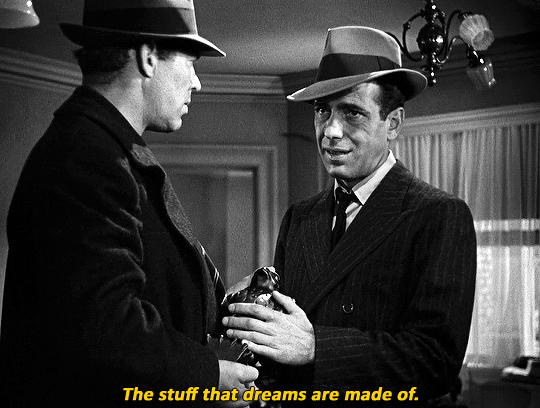
Hell of a film. My thoughts? Worth about 92¢.
Cast and Acting: 10/10
Plot and Writing: 9/10
Direction and Cinematography: 10/10
Production and Art Design: 9/10
Music and Editing: 8/10
...Also, yeah, enough of the noir speak. Got draining towards the end there. Real talk, this film is goddamn fantastic. Even knowing from the beginning that the falcon was fake didn’t matter to me; gorgeously shot and iconically written by John Huston, beautifully scored by Adolph Deutsch, and perfect acting literally all around (not a single weak point here for me, I loved it whole-heartedly), this movie...this is a great movie.
I’d have more analysis normally, but...I really don’t! It’s a great movie! My only notes are the fact that I wouldn’t really buy this sountrack (it’s good, but not playlist-worthy for me), the Falcon actually does just look like wood, and the writing is great, but also cheesy-as-hell. Still, in context, it works ridiculously well. If you’re a film fan, a mystery fan, or a film noir fan (especially if you’re a fan noir), this is your movie, hot damn! Can’t wait for another film noir! So, what’s next?

Next: The Third Man (1949), dir. Carol Reed
#the maltese falcon#film:the maltese falcon#the maltese falcon 1941#john huston#humphrey bogart#mary astor#peter lorre#sydney greenstreet#elisha cook jr.#lee patrick#gladys george#barton maclane#ward bond#user365#crime film#film noir#31 to life#31 films to life#johnsonshildy#userelissa
7 notes
·
View notes
Photo

@tcmparty live tweet schedule for the week beginning Monday, March 08, 2021. Look for us on Twitter…watch and tweet along…remember to add #TCMParty to your tweets so everyone can find them :) All times are Eastern.
Friday, March 12 at 8:00 p.m.
THE MALTESE FALCON (1941)
Hard-boiled detective Sam Spade gets caught up in the murderous search for a priceless statue.
#schedule#john huston#humphrey bogart#mary astor#gladys george#peter lorre#sydney greenstreet#barton maclane#lee patrick#ward bond#jerome cowan#elisha cook jr.#james burke#walter huston#film noir#classic film#classic movies#turner classic movies#live tweet#tcm party
34 notes
·
View notes
Photo

The Maltese Falcon @ the 7th Street Theatre
Great film. Easily one of the most beautiful cinemas I’ve ever been to. The sound was garbage.
#the maltese falcon#1941#film#movies#at the movies#7th street theatre#humphrey bogart#john huston#Dashiell Hammett#sam spade#Mary Astor#Gladys George#Peter Lorre#Barton MacLane#Lee Patrick#Sydney Greenstreet#Ward Bond#Elisha Cook Jr.
5 notes
·
View notes
Text
Flashfiction Friday: Rise and fall

A "Guilded Age" fanfic for @flashfictionfridayofficial . Will probably make a longer one for AO3 as I got stuck on the 1000 word thing.
!WARNING! This is set in the 1800s, some time-accurate references to one characters skin colour will be made. Nothing derogatory, just mentions of skin colour otherwise unneccesary.
“Now, remember Ladies, we are here not to pity, but to help. It is a gift, not a hand-out. No need to make them feel worse than they already do.” Miss Barton explained, some of her nurses going around and asking for people to group together as they handed out the supplies they were to disperse among the inhabitants of the poor labor camp. The women around her shifted nervously, either eager to get out of the squalor or eager to do some good deeds.
Out of her aunt’s eyes and ears, Marianne excitedly gestured for Gladys Russel to join them as they recieved their supplies, the younge heiress happily joining them.
“What’s in the bakset? Is it just food?” She asked curiously.
“There’s also medicine, and blankets and clothes” Peggy supplied, peering inside the heavy woven basket. “perhaps you should let me carry it Marianne”
Marianne shook her head. “Oh no, there is no need. It is not as heavy as it looks.” She said, smiling sweetly. She still struggled to see peggy as anything but her equal and so tried to fight the expectations when she could.
Peggy was about to argue back, reminding her that things were nto the same as they had been back in Pennsylvania, but Gladys interrupted them both.
“Lets get going, all the other ladies are already moving out” She remarked, gesturing to the thinning crowd around them.
Peggy and Marianne both nodded, and after a moment of hesitation they took a handle each and carried the basket between them. The roads, if they could even be called that, were wet and slippery with brown mud that stunk, telling of diseases and wastage hiding in it’s layers. It was disgusting for anyone used to something nicer, and suddenly Miss Barton’s warning not to show pity seemed all the more relevant.
“I don’t understand how one could possibly live like this” Gladys said worriedly, looking around at the meager shacks and tents that surrounded them. “it must be so miserable.”
“I am sure it is. But when you can’t afford an ything better, you are not happy not to sleep on the ground” Peggy noted wisely.
“And if it was of any living quality, nor would they need the generosity of Miss Barton” Marianne noted.
The three ladies nodded, in agreeance as to the situation they were facing, and, hopefully, would help to remedy with the aid of the gifts they brought along with them and which their mothers and relatives payed handsomely for to be purchased.
“I think our first stop is down here” Peggy pointed down a narrow pass between two tents. “We’re looking for lot forty-eight, the number has to be pinned on the tent.” She added, not sure if the other women had listened intently enough.
The two other women nodded, and the three of them began to try to squeeze their way down inbetween, careful not to trip on the wires holding up the tents on either side.
“Forty-eight” Gladys smiled as their endevour payed off and they saw the number pinned to the opening of a rugged tent, which more resembled a children’s playhouse for how small it was. “Do we knock?” She then asked, unceratain.
“Knock on what?” Marianne asked, a little bothered by Gladys behaviour. It felt as though she had expected something much better. “It’s a tent, there is no door!”
Their bickering seemed to have had an offect, however, as one half of the tarp that served as front door was pulled aside, a heavily pregnant woman hardly older then either of them making her exit.
“What on god’s green acre is going on? Are you lost?” She starre them up and down with shock and envy, semingly not even noting Peggy’s colour over the look of her clothes. Her own clothes were ragged, too small and leaving flesh exposed where her belly bulged under the outgrown shirt. she had no shoes on her dirty feed, the mud making them as brown as Peggy.
Marianne is first to recover, coughing and putting on a gentle smile. “We come from Miss Barton, and the red cross. She sent us to delivers supplies to you. For the winter.” She explained.
“Exactly! Food and blankets and clothes. There’s even some medication.” Gladys added eagerly, pointing to the basket her two friends were holding.
The woman seemed to calm down then, realizing what three fine ladies were doing in the knee high mud she called home. Gently, she bowed before them, holding out her skirt as best she could.
“Oh I see. Thank you, I am ever so grateful for these gifts.” She said, her voice composed well articulated as though she was, like them, a lady.
Marianne smiled. “You speak kindly. Surely it is we who are happy to give a gift to those who could use it.” She said.
Gladys was getting increasingly excited now, her mother owuld never have permitted her to even look at such a perosn. “And you speak and act very well! Who taught you that?”
The young girl smiled back. “My goveness did. And my mother. I can read and write to, not that it matters here” She looked around her. “i was once a lady just like you.”
Marianne’s face faltered then, as did those of her two lady companies. “You were? Then what happened? How did you end up here?” She asked.
The woman sighed, and once more looked around. “I guess when one rise, another fall. My mother and father’s families both lost most of their assets in the war. Once it was over, they lived the rest of their lives on what they had and could recoupe. it was not enough to leave anything once they were gone, and their families had all perished many years before.” She explained sadly, hurrying to reach for the basket of supplies, not enjoying the interegation.
The women nodded somberly, and Marianne felt her heart ache. Suddenly, the grace of Aunt Agnes to take her in seemed all the sweeter, and she was acutely aware of her luck in being as well-dressed and taken care of as she was. Quietly, they handed in the supplies and bid their goodbye.
Indeed, it seemed that when some fell, other rose.
5 notes
·
View notes
Text
Round One Has Finished!
Well, everyone, we've just concluded the first round of the Miss Billboard Tourney. Thank you all for participating thus far! Congratulations to the following, who are advancing to Round Two:
Lale Andersen
Julie Andrews
Patty Andrews
Joan Armatrading
Dorothy Ashby
Joan Baez
Pearl Bailey
Josephine Baker
LaVern Baker
Florence Ballard
Eileen Barton
Shirley Bassey
Lola Beltran
Teresa Brewer
Anne Briggs
Ruth Brown
Joyce Bryant
Kate Bush
Maria Callas
Blanche Calloway
Wendy Carlos
Diahann Carroll
Karen Carpenter
Charo
Cher
Gigliola Cinquetti
Petula Clark
Merry Clayton
Patsy Cline
Judy Collins
Rita Coolidge
Gal Costa
Betty Davis
Doris Day
Lucienne Delyle
Jackie DeShannon
Marlene Dietrich
Julie Driscoll
Cass Elliot
Agnetha Faeltskog
Marianne Faithfull
Mimi Farina
Ella Fitzgerald
Roberta Flack
Connie Francis
Aretha Franklin
Judy Garland
Crystal Gayle
Gloria Gaynor
Bobbie Gentry
Lesley Gore
Eydie Gorme
Margo Guryan
Sheila Guyse
Annie Haslam
Billie Holiday
Betty Hutton
Wanda Jackson
Joan Jett
Etta Jones
Gloria Jones
Grace Jones
Janis Joplin
Eartha Kitt
Chaka Khan
Gladys Knight
Sonja Kristina
Patti Labelle
Cleo Laine
Barbara Lewis
Abbey Lincoln
Julie London
Anni-Frid Lyngstad
Loretta Lynn
Lata Mangeshkar
Linda McCartney
Christie McVie
Jean Millington
Liza Minnelli
Carmen Miranda
Stevie Nicks
Nico
Laura Nyro
Odetta
Patti Page
Dolly Parton
Freda Payne
Ruth Pointer
Leontyne Price
Suzi Quatro
Bonnie Raitt
Carline Ray
June Richmond
Jean Ritchie
Clara Rockmore
Linda Ronstadt
Diana Ross
Buffy Sainte-Marie
Hazel Scott
Marlena Shaw
Nina Simone
Nancy Sinatra
Grace Slick
Mamie Smith
Patti Smith
Mercedes Sosa
Ronnie Spector
Barbra Streisand
Poly Styrene
Maxine Sullivan
Donna Summer
Pat Suzuki
Tammi Terrell
Sister Rosetta Tharpe
Big Mama Thornton
Mary Travers
Tina Turner
Bonnie Tyler
Sarah Vaughan
Akiko Wada
Dionne Warwick
Mary Wells
Tina Weymouth
Cris Williamson
Ann Wilson
Mary Wilson
Nancy Wilson
Syreeta Wright
The aforementioned ladies are accepting propaganda for their next posts. To give folks some time to prepare any sort of written/visual/audio propaganda for submission to my asks, Round Two will begin at midnight PST on July 10th.
22 notes
·
View notes
Photo

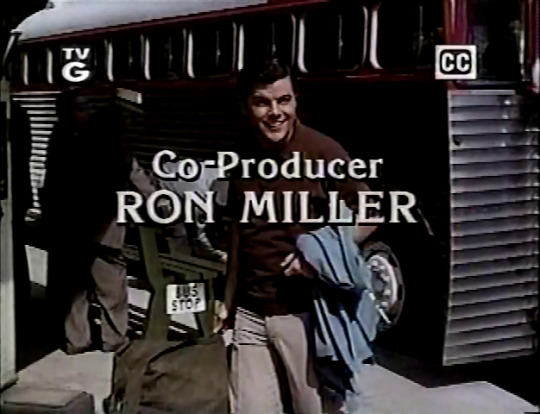
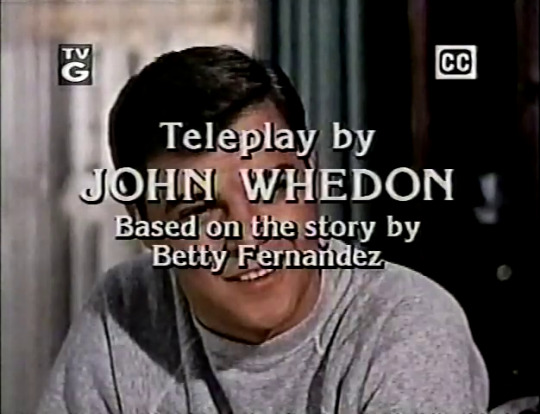



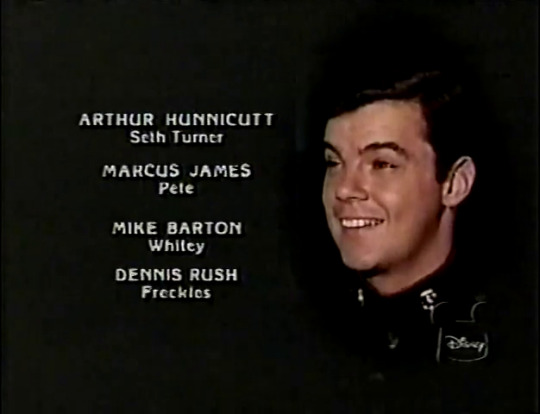
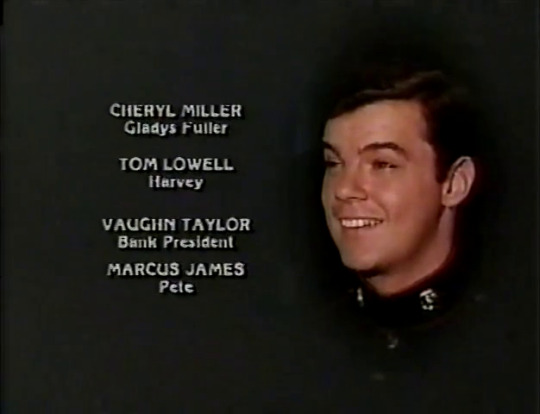
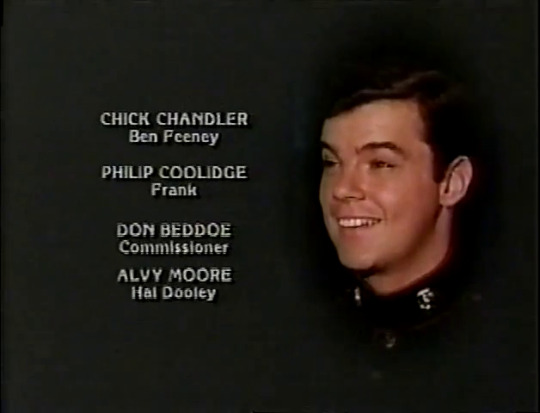
Kilroy - NBC - March 14 - April 4, 1965
A Presentation of Walt Disney's Wonderful World of Color
Family (4 episodes)
Running Time: 60 minutes
Stars:
Celeste Holm as Mrs Fuller
Allyn Joslyn as Mr. Fuller
Philip Abbott as Ed Barrett
Robert Emhardt as the Mayor
Bryan Russell as Billy Fuller
Warren Berlinger as Oscar Kilroy
Arthur Hunnicutt as Seth Turner
Marcus James as Pete
Mike Barton as Whitey
Dennis Rush as Freckles
Joie Russo as Porky
Cheryl Miller as Gladys Fuller
Tom Lowell as Harvey
Vaughn Taylor as Bank President
Chick Chandler as Ben Feeney
Philip Coolidge as Frank
Don Beddoe as Commissioner
Alvy Moore as Hal Dooley
#Kilroy#TV#Walt Disney's Wonderful World of Color#Family#1960's#Celeste Holm#Allyn Joslyn#Phillip Abbott#Robert Emhardt#Bryan Russell#Warren Berlinger
2 notes
·
View notes
Link
A Missouri man was put to death by lethal injection Tuesday for fatally stabbing an 81-year-old woman nearly three decades ago, the first U.S. execution since the coronavirus pandemic took hold.
Walter Barton, 64, had long maintained he was innocent of killing Gladys Kuehler, and his case was tied up for years due to appeals, mistrials and two overturned convictions. His fate was sealed when neither the courts nor Gov. Mike Parson intervened.
Barton breathed heavily five times after the lethal drug entered his body Tuesday evening, then suddenly stopped. In his final statement released prior to his execution, Barton said: "I, Walter "Arkie" Barton, am innocent and they are executing an innocent man!!"
Concerns related to the coronavirus caused several states to postpone or cancel executions over the past 2 ½ months. Until Tuesday, no one had been executed in the U.S. since Nathaniel Woods was put to death in Alabama on March 5. Ohio, Tennessee and Texas were among states calling off executions.
The last execution in Texas, the nation's busiest capital punishment state, was Feb. 6. Seven executions that were scheduled since then have been delayed. Six of the delays had some connection to the pandemic while the seventh was related to claims that a death row inmate is intellectually disabled.
Barton's attorney, Fred Duchardt Jr., and attorneys for death row inmates in the other states argued that the pandemic prevented them from safely conducting thorough investigations for clemency petitions and last-minute appeals. They said they were unable to secure records or conduct interviews due to closures.
Attorneys also expressed concerns about interacting with individuals and possibly being exposed to the virus, and they worried that the close proximity of witnesses and staff at executions could lead to spread of COVID-19, the disease caused by the coronavirus.
can’t stop the killings for anything
127 notes
·
View notes
Text
951.
(I have a ko-fi - I don’t often link, but February financially sucked, so.)
Clint Barton was not a good cook.
Sure, he’d been feeding himself for years, and he hadn’t died yet, but everything he put in his mouth was either functionally nutritious or heated from frozen and that suited him just fine. It wasn’t that he didn’t appreciate good food. It was just that his standards of ‘good’ had been honed from years of the circus into mostly just ‘enough’ and ‘covered in cheese’.
What Clint did have, though, was a hell of a green thumb. He’d tracked down - from faded and incomplete signs, and from years-old phone numbers, and from layers of shell corporations - the owners of a vacant lot just behind his building, and he’d bought it up without all that much of a fight. Now he was working on building a community garden project, everyone who wanted one with a little plot of land, and all the space left over growing crops that anyone could take.
It was a huge investment of time, but he had enough money that he didn’t need to invest in earning a wage, so time was a commodity he had plenty of outside of his Avenging. The thing with crops, though, was that it tended to be seasonal, and there was honestly only so much zucchini even Clint’s building could eat.
He’d thought about leaving it on people’s stoops, knocking and running, but then he’d found the soup kitchen a few blocks over and he’d become a regular patron.
So every few days Clint headed over, sacks full of groceries in a little cart. He took a bunch of the vegetables they’d harvested that week, and always spent some on a little bit extra too - sanitary supplies, deodorants, clothes, whatever the women who ran the place asked for, and always plenty of cheese.
The kitchen was always pretty busy, full of bustling people in aprons, so Clint mostly just found someone to take his haul and then buzzed off again. A couple of times, though, he’d found the place a little quieter than usual, and he’d stuck around to have a chat. The woman who’d started the place was called Dolores, and she was fearsome and practically spherical and had the biggest laugh of anyone Clint had ever met. He kinda wanted her to meet Thor; he thought the pair of them would get on. She always wore strips of cloth to keep her hair tamed a little back, bright colors and beautiful patterns, and her voice was rich with the sounds of somewhere far away.
“In,” she said one day, too busy for much in the way of words, and Clint followed her inside the kitchen and ducked down to let her hook an apron over his head, bemused as she pushed him to the sink and made him wash his hands - and then made him wash them again - before she let him loose with a knife on the carrots and tomatoes he’d brought. Clint was a master with a knife, trained and deadly, but according to her unimpressed snorting he still had a little to learn.
“You'll do,” she said finally, and just like that Clint was volunteering a couple times a week.
It was good work. Sociable and good for the soul, but also the kind of exhausting that tends to chase out the bad dreams. Clint was never allowed to have any kind of creative control in the kitchen - Clint was not a good cook - but he could follow orders with the best of them, and he was a strong and willing pair of hands.
Sometimes he was ordered to the serving line, whenever they were cooking anything that needed precise timings, or some element of skill. The old couple that mostly worked the serving line liked how easy he found it to haul around the huge service trays, even if Gladys kept yelling at him for forgetting to use potholders. It was kinda mechanical work, shovelling out spoonfuls of rice or pasta or potatoes, directing people to the silverware, but he handed out smiles with the food and sometimes got a few words outta them if the demand was a little slow.
It got him out of his head, and his head had never been a great place to be.
It wasn’t something he talked about to the Avengers, though. He didn’t want Tony making it into a Thing, photoshoots and Avengers kudos, everyone coming down to get a glimpse. (Clint was aware they’d be hoping for a glimpse of Captain America, not Hawkeye, but his relevant anonymity had never been anything but a blessing.)
Maybe if people had known he was there, though, he wouldn’t have got stabbed.
*
It was a day much like any other. Clint had been bullied out to the front of house, collecting up plates and silverware that were finished with and stacking them in a huge plastic tub. He’d already spilled food down the front of his shirt, and that meant he’d get crammed into one of the kitchen’s promotional shirts that were always two sizes too small, and it also meant that he was likely to get wolf-whistled by Gladys and Terry when he had to strip off his own shirt.
That was mostly what he was thinking about, mechanically collecting and scraping and storing plates, and he honestly wasn’t expecting to look up into gunmetal blue eyes that widened and filled with fear.
“Hey,” he said, putting the tub down on a table and raising his hands, “no need to -”
He registered the metal arm too late, reacted too late, felt his legs go out from under him even before he felt the knife in his side. He saw fleeing feet, heavy boots and the stumbling run of someone too tired and hungry to function; he saw the bloodprints they left behind them.
Dolores had just made him mop the goddamn floor that morning; if he managed to survive this, there was no way she wasn’t gonna make him do it again.
173 notes
·
View notes